
Competition-Based Program Helps Bring New Dairy Ideas to Market
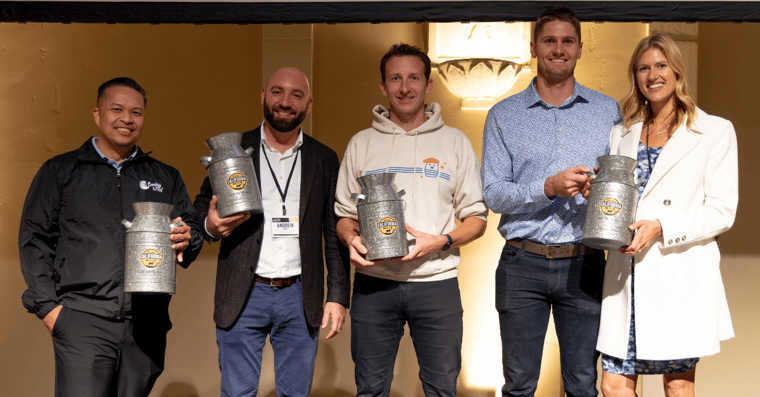 Winners of the 2023 pitch competition, from left, Donald Anit, founder Amazing Ice Cream; Andrew Arbogast, founder and CEO Arbo's Cheese Dip; Maxime Pouvreau, founder Petit Pot; Rob Diepersloot, founder, and Erica Diepersloot, co-founder WonderCow.
Winners of the 2023 pitch competition, from left, Donald Anit, founder Amazing Ice Cream; Andrew Arbogast, founder and CEO Arbo's Cheese Dip; Maxime Pouvreau, founder Petit Pot; Rob Diepersloot, founder, and Erica Diepersloot, co-founder WonderCow.
What will dairy be for the next generation? Can the market be sustained by the classics?
California’s Milk Advisory Board started the Real California Milk Excelerator Program in 2019 to help boost industry sales in the state. From sleep-enhancing ice cream to colostrum supplements to antique Indian yogurt drinks to whey-based spirits, brands and products have found a footing through the program.
“Someone asked, ‘What’s next in dairy?’ The answer is dairy. It’s such a great line because it’s about how do you reimagine that for new consumers and find things that they’re passionate about and evolve your products,” said Fred Schonenberg — founder and CEO of VentureFuel, which is supporting the Board’s Excelerator program.
In its fifth year, Excelerator invites global startups to apply. Selected applicants are then introduced to California’s dairy industry.
They meet with specialists — public relations agents, lawyers and processing experts to name a few — to start to build their brand, company and sales.
Companies also create a 30-second commercial and pitches — Shark Tank-style, Schonenberg said — that they present in competition at a large dairy expo. Based on the pitches, four finalists are chosen to receive a grant.
Over the next year, the four finalists compete to see who can make the most sales. They continue to have access to specialists to help with growth and design.
“We get very involved in terms of helping them. We have a vested interest in all of them succeeding, so we want to do everything we can to help ensure they’re successful,” said John Talbot, California Milk Advisory Board’s CEO.
Products in the program must be at least 50% dairy, Schonenberg said, and all of that must come from California’s dairy industry.
But not all industry benefits of the Excelerator come directly from dairy product sales.
To help acclimate startups to California dairy, participants visit local farms. Fiscalini Farmstead, a 100-plus-year dairy that started processing milk and making cheese 24 years ago, is one of those.
CEO Brian Fiscalini enjoys offering tours to Excelerator participants so he can join in the conversation. The startups get to see a working dairy and processing facility at the farmstead, and they can learn about regulations and equipment.
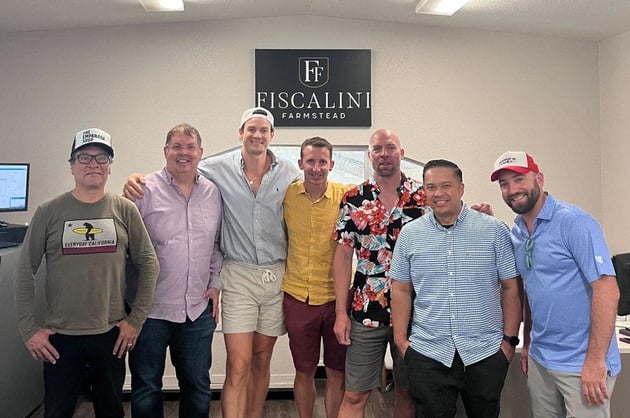
Accepted applicants for the California Real Milk Excelerator start their training at Fiscalini Farmstead where they experience a California dairy and processor.
And Fiscalini and his team benefit from the modern ideas and inspiration.
“Selfishly, we might learn a lot from them as well because it kind of helps keep that entrepreneurial, startup spirit going when you talk to people that are still in that mode,” Fiscalini said.
Some program ideas take a wide look at “dairy,” introducing new items to the market.
Wheyward Spirits is a liquor made from whey, a byproduct of cheese making. It’s available online and in stores in California, Nebraska and Oregon.
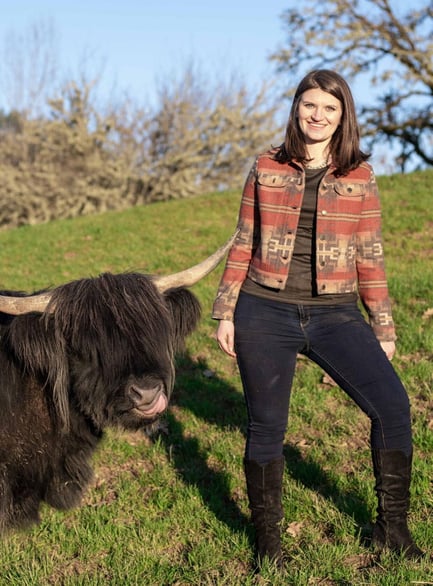
Emily Darchuk of Wheyward Spirits.
Emily Darchuk, Wheyward Spirits founder, started her career working in product development, looking to solve problems. She saw a wasted item and a niche in the liquor industry and decided to fill a hole.
“I really saw an opportunity to give back to our domestic food system but also bring a best-in-class innovation for consumers who care,” Darchuk said.
The original Wheyward Spirit is velvety and similar to a vodka, Darchuk said. After implementing an aging process, Darchuk released a Wheyward Wheyskey, new this year.
She said the liquors are diverse and can be used in most traditional cocktails.
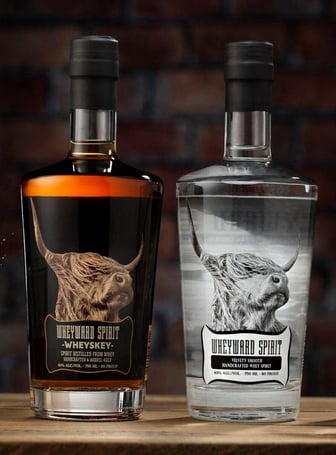
Wheyward wheyskey and Wheyward spirit, which are both made from whey, a byproduct of cheese making. The spirits are versatile in different cocktails.
By the time Darchuk applied for the Excelerator, the spirit had already won national awards, but going through the program helped her to build a community of partners that she can help and that help her. Trade shows, hosted by the California Milk Advisory Board, have also helped Wheyward Spirit gain attention.
“We’re right next to the cheese makers where we’re sourcing the whey in California, so we’re able to really tell a unique story that connects to where we’re from,” Darchuk said.
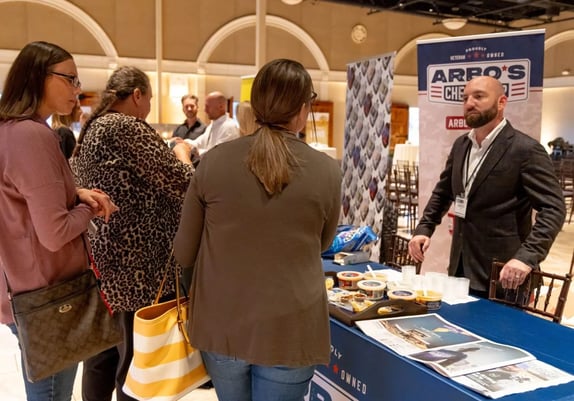
Expo participants talk with contestants.
The business was also able to become carbon-neutral certified while in the Excelerator.
In the coming months, Wheyward Spirit is planning to increase its partnerships, get Wheyskey in retail stores and sell products to bars and restaurants.
Last year’s grand-prize winner was more traditional. It was yogurt.
But, the product, lassi, dates to 3,000 years ago in India. The dairy drink is a combination of yogurt, roasted spices and fruit puree.
Emily Gilels brought the recipe to California in 2005 when she opened DOSA, a south Indian restaurant. Inspired by the food of the region after traveling there, Gilels wanted to share the cuisine with America.
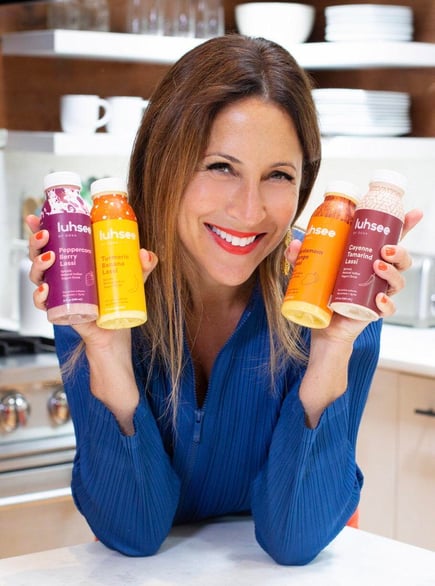
Emily Gilels, founder of DOSA and dosa by DOSA, which sells lassi, a yogurt-based drink that includes spices and fruit puree and dates back 3,000 years ago.
“I wasn’t aware that there was this region that lined India that was coastal that had coconut palm forests and grew things like lentils and fresh curry leaves and mustard seeds, and when I had this like light, tropical cuisine — which is how southern Indian food is largely described, it’s light and tropical and protein rich and vegetarian friendly — I just was blown away,” Gilels said.
But the restaurant closed during the COVID-19 pandemic, leading to a conversion into a consumer-packaged- goods business. Shortly after the transition started, VentureFuel reached out to Gilels, inviting her to apply for the Excelerator.
Between lessons in marketing, brand design, fundraising and networking, Gilels grew her new business, dosa by DOSA. After being chosen as a final-four contestant and entering the sales contest, dosa by DOSA saw a 185% increase, Gilels said.
But she isn’t done. She would like to see the lassi market expand in America and drive dosa by DOSA sales international.
“Our goal is to introduce lassi to the U.S.,” Gilels said. “When the U.S. market is all drinking and enjoying lassi as part of their routine, whether it’s snacking or on the go, and across generations, we’ll feel like we’ve achieved our goals.”
Pitch winners from the November 2023 expo, who are now in sales competitions until November 2024, include Amazing Ice Cream, Arbo’s Cheese Dip, Petit Pot and WonderCow.
When considering applicants, the California Milk Advisory Board evaluates factors like scalability, shelf stability and potential challenges.
Different years have also had different themes. Two years ago, the theme was performance and recovery.
That year, Nightfood ice cream won. The dessert was designed to help encourage a good night’s sleep. It succeeded with marketing to hotels for those who were worried about poor sleep while away from home, Talbot said.
Similar programs have been run in other states, including the New York Milk Launch in 2020 and 2022, Schonenberg said. But none have scaled to the size of the Excelerator.
He attributes California’s successful program to support and creativity in the state.
“A willingness to do something new and different is really the prerequisite, and then from there, it’s about finding the pieces and putting them together,” Schonenberg said.
While all dairy farmers may not connect directly with an Excelerator product, the program is keeping dairy fresh and relevant in the state and introducing new ideas to the national market.
“From a dairy farmer perspective, I think the Excelerator program is very valuable so that we can continue to find folks outside of the milk production business that are more on the innovation and product side,” Fiscalini said. “I think that’s really important so that we continue to find new outlets and increase demand for California milk.”
